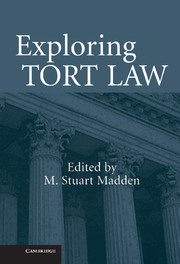Book contents
- Frontmatter
- Contents
- Contributors
- Preface
- INTRODUCTION
- SECTION I TORT LAW IN THE NEW MILLENNIUM: PAST AS PROLOGUE
- 1 TORT LAW THROUGH TIME AND CULTURE: THEMES OF ECONOMIC EFFICIENCY
- 2 PAST AS PRELUDE: THE LEGACY OF FIVE LANDMARKS OF TWENTIETH-CENTURY INJURY LAW FOR THE FUTURE OF TORTS
- SECTION II COMPENSATION AND DETERRENCE IN THE MODERN WORLD
- SECTION III DUTY RULES, COURTS, AND TORTS
- SECTION IV TORTS IN A SHRINKING WORLD
- Index
1 - TORT LAW THROUGH TIME AND CULTURE: THEMES OF ECONOMIC EFFICIENCY
Published online by Cambridge University Press: 05 June 2012
- Frontmatter
- Contents
- Contributors
- Preface
- INTRODUCTION
- SECTION I TORT LAW IN THE NEW MILLENNIUM: PAST AS PROLOGUE
- 1 TORT LAW THROUGH TIME AND CULTURE: THEMES OF ECONOMIC EFFICIENCY
- 2 PAST AS PRELUDE: THE LEGACY OF FIVE LANDMARKS OF TWENTIETH-CENTURY INJURY LAW FOR THE FUTURE OF TORTS
- SECTION II COMPENSATION AND DETERRENCE IN THE MODERN WORLD
- SECTION III DUTY RULES, COURTS, AND TORTS
- SECTION IV TORTS IN A SHRINKING WORLD
- Index
Summary
abstract. As human societies developed, a bedrock necessity was the development of expectations and norms that protected individuals and families from wrongful injury, property damage, and taking. Written law, dating to the Babylonian codes and early Hebrew law, emphasized congruent themes. Such law protected groups and individuals from wrongful injury, depredation of the just deserts of labor, interference with the means of individual livelihood, and distortion of the fair distribution of wealth.
Hellenic philosophers identified the goals of society as the protection of persons and property from wrongful harm, protection of the individual's means of survival, discouragement of self-aggrandizement, and the elevation of individual knowledge that would carry forward and perfect such principles. Roman law was replete with proscriptions against forced taking and unjust enrichment, and included rules for ex ante contract-based resolution of potential disagreement. Customary law perpetuated these efficient economic tenets within the Western world and beyond. The common law has pursued many of the same ends. From the translation of the negligence formula of Judge Learned Hand into a basic efficiency model to the increasing number of judicial opinions that rely explicitly upon economic analysis, efficiency themes can be predicted to enjoy a continued and increasingly conspicuous place in modern tort analysis.
INTRODUCTION
Tort law represents a society's revealed truth as to the behaviors it wishes to encourage and the behaviors it wishes to discourage.
- Type
- Chapter
- Information
- Exploring Tort Law , pp. 11 - 51Publisher: Cambridge University PressPrint publication year: 2005



